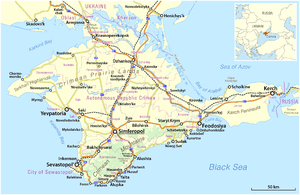Russian–Ukrainian Friendship Treaty
| Treaty on Friendship, Cooperation, and Partnership between Ukraine and the Russian Federation | |
|---|---|
| Signed | May 31, 1997[1] |
| Effective | 1 April 1999 |
| Expiration | 31 March 2019 |
| Signatories | |
| Languages | Ukrainian, Russian |
Treaty on Friendship, Cooperation, and Partnership between Ukraine and the Russian Federation — is an agreement between Ukraine and the Russian Federation, signed in 1997, which fixed the principle of strategic partnership, the recognition of the inviolability of existing borders, respect for territorial integrity and mutual commitment not to use its territory to harm the security of each other.[2] Ukraine announced its intention not to renew the treaty in September 2018.[3] By doing so the treaty will expire on 31 March 2019.[3]
Until 2019 the treaty was automatically renewed on each 10th anniversary of its signing, on the condition that one party advised the other of its intention to end the treaty.[4][5]
Russian-Ukrainian relations have deteriorated since the 2014 Russian annexation of Crimea and Russian support for pro-Russian separatists in the war in the Ukrainian Donbass region.[6] In response, Ukrainian President Petro Poroshenko signed a decree not to extend the treaty.
Signing and Ratification
The treaty was signed in Kiev May 31, 1997 by the President of Ukraine Leonid Kuchma and Russian President Boris Yeltsin.[1]
In Ukraine, the treaty was ratified by Law of Ukraine N 13/98—ВР on 14 January 1998 (On ratification of the Treaty of Friendship, Cooperation and Partnership between Ukraine and the Russian Federation) [7]
In the Russian Federation in December 25, 1998 the State Duma of Federal Assembly of the Russian Federation adopted a resolution on the adoption of the federal law «On ratification of the Agreement of Friendship, Collaboration and Partnership Between the Russian Federation and Ukraine» and directed it to the Federation Council. The Federation Council approved this Federal Law by Resolution from 17 February 1999. The treaty was ratified.[8]
Contents of the treaty
Under the agreement both parties ensure the citizens of the other countries' rights and freedoms on the same basis and to the same extent that it provides for its citizens, except as prescribed by national legislation of States or international treaties.
Every country protects in established order of the rights of its citizens living in another country, in accordance with commitments to documents Organization for Security and Cooperation in Europe and other universally recognized principles and norms of international law, agreements within the CIS.
The agreement, among other things prematurely confirms the inviolability of borders of countries[9], regardless that Russia and Ukraine have never agreed on the final ratification and demarcation of a border between the two countries.[10]
Under Article 2:
«In accord with provisions of the UN Charter and the obligations of the Final Act on Security and Cooperation in Europe, the High Contracting Parties shall respect each other′s territorial integrity and reaffirm the inviolability of the borders existing between them.»[11][5][12]
The Treaty document stipulates in Article 40 that the Treaty is entered into for a period of 10 years and renews automatically unless one of the parties notifies the other of its intention to curtail the Treaty.[9]
Termination
On 19 September 2018 Ukrainian President Petro Poroshenko signed a decree not to extend the treaty.[3][13] According to Poroshenko the non-renewal "does not require a vote" in the Ukrainian parliament.[14] Ukraine announced that on 21 September 2018, it would notify the United Nations and other relevant organizations on the termination of the treaty.[15] Russia's Ministry of Foreign Affairs said that it was notified on 24 September 2018 of the treaty's termination by Ukraine, expressing regret.[16]
See also
References
- 1 2 http://calhoun.nps.edu/bitstream/handle/10945/8939/russianukrainian00stew.pdf Dale B. Stewart. THE RUSSIAN-UKRAINIAN FRIENDSHIP TREATY AND THE SEARCH FOR REGIONAL STABILITY IN EASTERN EUROPE. THESIS.NAVAL POSTGRADUATE SCHOOL Monterey,California. December,1997
- ↑ "Setting Past Aside, Russia and Ukraine Sign Friendship Treaty". The New York Times. 1 June 1997. Retrieved 27 April 2016.
- 1 2 3 Poroshenko's decree on non-extension of Treaty of Friendship with Russia officially published, UNIAN (19 September 2018)
- ↑ http://calhoun.nps.edu/bitstream/handle/10945/8939/russianukrainian00stew.pdf Dale B. Stewart. THE RUSSIAN-UKRAINIAN FRIENDSHIP TREATY AND THE SEARCH FOR REGIONAL STABILITY IN EASTERN EUROPE. THESIS.NAVAL POSTGRADUATE SCHOOL Monterey,California. December,1997
- 1 2 "Bound by treaty: Russia, Ukraine and Crimea". DW.COM. Retrieved 27 April 2016.
- ↑ Ukraine Terminates Friendship Treaty With Russia, The Moscow Times (17 September 2018)
- ↑ "Про ратифікацію Договору про дружбу, співробітництво і пар... - від 14.01.1998 № 13/98-ВР". Retrieved 27 April 2016.
- ↑ "Журнал «Дипломатичний вісник»: Постанова Державної Думи Федерального Зібрання РФ".
- 1 2 www.dtic.mil/dtic/tr/fulltext/u2/a341002.pdf
- ↑ "УКРАЇНА МОЖЕ ВІДГОРОДИТИСЯ ВІД РОСІЇ ПАРКАНОМ". Українська правда.
- ↑ "Договір про дружбу, співробітництво і партнерство між Укра... - від 31.05.1997". Retrieved 27 April 2016.
- ↑ "Treaty on Friendship, Cooperation, and Partnership between Ukraine and the Russian Federation". JSTOR 41036701. Missing or empty
|url=(help) - ↑ "Петро Порошенко on Twitter". Twitter. Retrieved 2018-09-17.
- ↑ No more friendship: Everything about Russian–Ukrainian Friendship Treaty, 112 Ukraine (5 September 2018)
- ↑ "Ukraine Set To Inform Russia of Termination Of Friendship Treaty". Radio Free Europe/Radio Liberty. 2018-09-20. Retrieved 2018-09-20.
- ↑ "Moscow regrets Ukraine's decision not to extend friendship treaty". TASS. 25 September 2018. Retrieved 25 September 2018.
